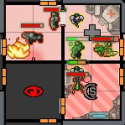|
So I've started reading All the Kremlin's Men and I realised that I don't really know much about wars in Chechnya. What would be good sources to start?
|
|
|
|

|
| # ? Apr 16, 2024 17:15 |
|
The Ernst Mach Institute is here, it's cool as gently caress. Its other official name is Fraunhofer Institute for Short Time Dynamics (Kurzzeitdynamik) they blow stuff up http://www.emi.fraunhofer.de/en.html It's also probably a problem to armor solar panels and sensors and antennas etc, ie everything that makes the satellite be able to do stuff. This is probably my most idiotic question yet but how did people make all those pole arm poles? I seem to be lacking the terminology to phrase the question in a sufficiently specific way to get anything out of Google.
|
|
|
|
take wood from a species of tree that has tough, strong, springy wood (like ash or, if you're in the US, hickory?) and plane it into a cylinder of the proper length edit: in the 21st century it costs a lot to do this--you have to pay the dudes for labor and it's more expensive than you think to get that much ash. HEY GUNS fucked around with this message at 16:01 on Jul 9, 2016 |
|
|
|
oohhboy posted:So no, there is no good way to kill a satellite without leaving a hell of a mess. Send up another satellite with a substantial rocket motor, it grabs the target satellite and does a deorbit burn. The fact that this capability has not been developed by anyone who has spent the money to develop anti-satellite weapons indicates that the "leaves a hell of a mess" problem is considered less important than the capability to destroy your enemy's satellite. Deteriorata posted:There are no stable platforms in space, your platform will rotate and change orbit slowly as you fire, so you'll have to recompute your aim for every shot You present this as if it's some sort of major problem. Recomputing aim for every shot is something we were doing with analog fire-control computers over 70 years ago. quote:- and save all the spent shell casings, as they're more space junk otherwise. You're creating space junk by destroying your target. And "spent shell casing" is making a lot of assumptions about the nature of the weapons system. Why does it have to have shell casings? If it does, why is saving them such a problem? quote:Aiming is more plotting the orbit of your bullet (which can't be altered in-flight) You seem to be envisioning gunfights. Why? quote:All in all, my point stands that conventional weapons in outer space would be effectively useless. They would work on a very small scale, but any meaningful attempt to use them would be disastrous, which would make putting them in space in the first place rather ill-advised. Again: Conventional weapons for use in outer space have been developed by at least three major nation states, and actually used to destroy satellites in orbit by all three of them. The Soviets also have, at times, developed various laser systems capable of blinding the sensors of target satellites. That's pretty clearly a weapon that produces no space junk at all. Phanatic fucked around with this message at 16:53 on Jul 9, 2016 |
|
|
|
Phanatic posted:Send up another satellite with a substantial rocket motor, it grabs the target satellite and does a deorbit burn. That, and the fact that even the slightest potential for maneuvering by the target would make this nigh impossible to achieve.
|
|
|
|
RORSAT chat: IIRC, RORSATs were launched into exceptionally low orbits, and the debris from a notional ASAT shot would have become a non-issue relatively quickly. They were designed to boost their reactor core into a much higher graveyard orbit, which is why there are still RORSAT reactor bits flinging around out there.
|
|
|
|
my dad posted:That, and the fact that even the slightest potential for maneuvering by the target would make this nigh impossible to achieve. Hey, most of the design compromises that made the Space Shuttle so ridiculously oversized and overweight and deleted the crew escape capability were a direct result of the USAF wanting the shuttle to be able to do exactly that: launch, grab a Soviet satellite when it's out of radar coverage of the USSR, and then deorbit and land at Vandenberg. Satellites don't continuously monitor the volume of space around themselves, unless someone's watching the target and actively commanding it it's not going to be able to take evasive maneuvers. Was this a ridiculous idea? Yeah. Was it so ridiculous it prevented us from turning the promising shuttle program into a giant expensive white elephant? Nope. MrYenko posted:RORSAT chat: IIRC, RORSATs were launched into exceptionally low orbits, and the debris from a notional ASAT shot would have become a non-issue relatively quickly. They were designed to boost their reactor core into a much higher graveyard orbit, which is why there are still RORSAT reactor bits flinging around out there. And a couple more sitting on the bottom of the ocean floor, either because of a launch failure or a failure of the ejection launch. One broke up on reentry and scattered radioactive debris across 50,000 square miles of Canada. Phanatic fucked around with this message at 16:44 on Jul 9, 2016 |
|
|
|
Phanatic posted:And a couple more sitting on the bottom of the ocean floor, either because of a launch failure or a failure of the ejection launch. One broke up on reentry and scattered radioactive debris across 50,000 square miles of Canada. RORSAT: Doing it's part to warm up the Canadian frontier.
|
|
|
|
Fish of hemp posted:So I've started reading All the Kremlin's Men and I realised that I don't really know much about wars in Chechnya. What would be good sources to start? That book looks very interesting. Where did you get your copy from? The Amazon link says it's not released till September?
|
|
|
|
HEY GAL posted:take wood from a species of tree that has tough, strong, springy wood (like ash or, if you're in the US, hickory?) and plane it into a cylinder of the proper length Holy poo poo I had completely forgotten that planes exist. I realized my question was dumb but I had no idea that it was this dumb I thought people would use like a big whittling knife or something.
|
|
|
|
BeigeJacket posted:That book looks very interesting. Where did you get your copy from? The Amazon link says it's not released till September? I bought my copy from a finnish e-book dealer. I guess it's not available in english yet.
|
|
|
|
HEY GAL posted:take wood from a species of tree that has tough, strong, springy wood (like ash or, if you're in the US, hickory?) and plane it into a cylinder of the proper length
|
|
|
|
Siivola posted:Doesn't the wood also have to be free of knots? I would imagine finding a pike's worth of straight wood is a pain in the ash all by itself. I imagine there was a cottage industry in farming saplings that could be pruned free of limbs as they grew, then cut down at the right size to minimize the hand working needed. Long poles had uses other than for making pikes, so it was probably a pretty good business.
|
|
|
|
In case anyone's interested in taking a close-up look at some nice powder flasks, Rock Island Auction is selling a lot of them on an online auction August 5th. They estimate the lot to go for $600-800. If you don't have the money to drop, use the high resolution picture to take a nice look at them! One of them is a James Dixon & Sons flask. They were a British company established in Sheffield in 1806, so it's likely that more than one of these are of a 19th century British design for sportsmen.
|
|
|
|
|
Deteriorata posted:I imagine there was a cottage industry in farming saplings that could be pruned free of limbs as they grew, then cut down at the right size to minimize the hand working needed. Long poles had uses other than for making pikes, so it was probably a pretty good business. More or less 
|
|
|
|
aphid_licker posted:
Deteriorata posted:I imagine there was a cottage industry in farming saplings that could be pruned free of limbs as they grew, then cut down at the right size to minimize the hand working needed. Long poles had uses other than for making pikes, so it was probably a pretty good business. Some species grow very straight and tall with the right care, like various forms of ash. Other wood like Cornus Mas is even better, but hard to find lenghts for a pike. The best way to produce the very long laths you'd need for pikes, is to take the trunk of about 30-40 year old ash to a sawmill and cut it up to scantling. Then they're dried (drying a whole trunk takes exponentially longer than laths e.g.). From that, you can either turn it, or plane it to the desired form. These shafts aren't always round, especially on halberts. I don't think I've ever seen one in a museum here that had a round shaft. Speaking of which, if it's ash, you can look at it and see the way it was sawn. If they're made by copicing, you'd also notice. The laths that bowyers used for ottoman bows were also from trees that were coppiced. Acer tartaricum nowadays is often found in gardens, because a subspecies of that family has leaves of very bright red colours. Siivola posted:Doesn't the wood also have to be free of knots? I would imagine finding a pike's worth of straight wood is a pain in the ash all by itself. Finding a flawless piece of wood that's 1m long is doable, but the longer it needs to be, it gets exponentially harder to find. That's beside the point anyway, a bowyer might hope for relatively flawless wood, for obvious reasons. For a stabby stick, don't cut across the grain and you're fine.
|
|
|
|
Great posts guys, thank you. The thing where in the age of sail trees of a particular type and size were state property for use as masts and where really hard to come by at times was something that really helped drive home to me the fact that armaments didn't only recently end up at the bleeding edge of what technology and the economy could provide.
|
|
|
|
100 Years Ago 8 July: The Royal Flying Corps has been trying to do some long-range rear area bombing. Results are mixed, but as long as technology can catch up with the idea, they might be on to something. On the ground, far too late the men are now moving into Trones Wood, arguably a worse place to fight a war than any trench. General Haig complains about the Press; Lt-Col Fraser-Tytler shoots at Trones Wood a lot; Enver Pasha's failure to appoint an army group commander in the Caucasus is about to bite everyone on the arse; Maximilian Mugge is unexpectedly transferred, although to no great effect; and Evelyn Southwell is beginning to struggle with the dead hand of disillusionment, having heard extremely worrying rumours about Malcolm White's battalion. 9 July: Time is running out for the Germans to capture Fort Souville, and it's always worth reminding ourselves that General von Falkenhayn is fast losing whatever mojo he might have had. The French Senate goes into secret session; General Haig is displeased with the recent farce at Mametz Wood; Herbert Sulzbach has been ordered to move, horror of horrors; Maximilian Mugge casts aspersions on the ability of certain personages to avoid the Big Push; and there is a postscript to a small story that now ends for good.
|
|
|
|
There seems to be a lot of lying, false and deliberately trying to make things seem better than than they are in the British Army, and that starts from Haig on down. Of course it's confusing and pretty much impossible to get accurate facts, but Haig seems much more optimistic than he should be, and much less likely to activity go and see the results of his choices for himself. There's a culture there of not telling the truth and it's going through the entire army. Wilful Blindness is impacting every single army though, any I presume most people who tried to stop it would just end up getting shot (particularly in Italy) or going mad from trying to deal with it. 'Corse the same things happened in this century with the Iraq war, but the issue appears to be infecting every single army commander on all sides. Haig is not coming out of this as a good leader. Sure we might see he gets better in 1918, but give anyone a million dead soilders man hours to learn something and anyone else would have too. Seeing this day by day is extremely illuminating.
|
|
|
|
I've been reading the book version of the WWI day by day, so sorry for 1915 questions- 1) Was there seriously no general available in Austria Hungary better than Conrad von Hotzendorf? 2) Did entente propaganda ever refer to him as Conrad von Hottentot? Just sounds like the sort of thing a period newspaper would do.
|
|
|
|
Comstar posted:
At least re: Iraq you are mixing up military authorities and civil occupation administration.
|
|
|
|
P-Mack posted:1) Was there seriously no general available in Austria Hungary better than Conrad von Hotzendorf? Svetozar Borojević. Deeply hosed up individual, but by far the most competent of the lot. Being a Slav was somewhat of an obstacle in being assigned to important posts.
|
|
|
|
So have we never had a war movie about either Operation Olympia or Unthinkable?
|
|
|
|
Raenir Salazar posted:So have we never had a war movie about either Operation Olympia or Unthinkable? Well these would be alternate history, which is still a pretty niche genre for big budget films. (No, I don't count U-571 and its ilk in this category  ) )Speculating a historical event out of whole cloth based on the facts instead of doing research and interviews is probably one reason - it requires a different approach. Not sure if it's necessarily more difficult, but corners are cut on accuracy all the time, either for convenience's sake or for drama's. Another reason is that audiences just prefer to see movies about things that actually happened - maybe there's an educational pretense attached to this. There's also the risk that if you play it straight, people will come out of it thinking that the Allies did in fact invade Japan. So you'd need some kind of time machine story or whatever, and now you're making a science fiction war movie, which can still be great, but are niche. Sulphagnist fucked around with this message at 08:18 on Jul 10, 2016 |
|
|
|
Antti posted:There's also the risk that if you play it straight, people will come out of it thinking that the Allies did in fact invade Japan. So you'd need some kind of time machine story or whatever, and now you're making a science fiction war movie, which can still be great, but are niche. Eh, just put a placard at the start and end of the film saying its not based on actual historical events. It was good enough for Dr. Strangelove. 
|
|
|
|
Trin Tragula posted:100 Years Ago Well the suffering, the sorrow, the glory the shame, oh Malcolm White it was all done in vain....
|
|
|
|
HEY GAL, question for you: I got a bunch of rowan trees growing in the yard of my new house and I started wondering if people used that for pikes. I should make a pike.
|
|
|
|
Kemper Boyd posted:HEY GAL, question for you:
|
|
|
|
Kemper Boyd posted:I got a bunch of rowan trees growing in the yard of my new house and I started wondering if people used that for pikes. I should make a pike. According to Wikipedia it's used for walking sticks so if it isn't too weak in the modulus of rupture and doesn't flex too much it should be usable but because it's dense when you get out to serious lengths you have to worry about it breaking under its own weight. Edit: I missed it the first time through on the wood database, but found it this time. So Rowan is harder and stronger both against crushing and rupture than European Ash but it is also noticeably more flexible which means your pike would sag a lot. Cornus Florida (they don't have data for Cornus Mas) is better on all counts than ash, which makes sense. Rodrigo Diaz fucked around with this message at 15:58 on Jul 10, 2016 |
|
|
|
For lack of a better word, how industrial is this process of making polearms? Are the parts standardised? Is there any sort of mass production?
|
|
|
|
Kemper Boyd posted:HEY GAL, question for you: It depends. You should try it. Dogwood is also on the list of good hardwoods. It was some time ago that somebody posted a latin text that mentioned cornus mas being synonymous with spearshaft. Other than making jam from the fruits, it was used for making wheels.
|
|
|
|
Kemper Boyd posted:HEY GAL, question for you: make sorbus instead
|
|
|
|
Save the earth,
|
|
|
|
Can someone give me a brief rundown on the british military structure of WW1? I keep seeing references to things like 5th/7th Lancastershire Rifles, and I don't understand what that means.
|
|
|
|
Ah good, an excuse to write this up properly, which I've been meaning to do for a while. In Britain, unlike some other countries, the basic large organisational unit is the battalion of just over 1,000 men. All battalions belong to a regiment (and each regiment recruits from a specified area and therefore has a strong local identity of some sort), but more often than not during the war, individual battalions are mix-and-matched into brigades (of about 3,000 to 5,000 men at full strength) and do not necessarily operate together. The number identifies the battalion, the name identifies the regiment: so "1st KOYLIs" expands to "1st Battalion, King's Own Yorkshire Light Infantry". In the Army of 1915 and 1916, there were three flavours of battalion. The first is the pre-war Regular Army battalions. With some exceptions, each regiment had four battalions, numbered 1st through 4th. Only two of these actually existed as active units, though; the other two were composed of men who had served their time "with the colours" and then gone into Civvy Street as part of the Army Reserve. While in the reserve, they were liable to recall at any time. So you have two battalions in each regiment that before the war existed on paper, and two active battalions that existed in practice. The usual arrangement was for one battalion to be stationed in Britain, ready to make up the British Expeditionary Force if required; the other battalion would be off somewhere in the British Empire flying the flag and keeping the natives in line. When it got to its station, it would quite often then be split up into its four companies, and each company sent off on independent duties. This is why even today in the British Army the usual rank for a company commander is Major, not Captain; the colonial gendarmerie needed a more experienced officer in charge of things. (I'm also planning to write more soon on how this leads to the duelling culture of "do what you're told and follow orders" and "as the man on the spot, you have absolute discretion to act as you see fit", which is great in a colonial context, but which is currently helping paralyse actions on the Somme.) Then you have something called the Territorial Force, which in 1914 was still a deeply newfangled idea. The theory was that in the event of total mobilisation, the Territorials would be called up and defend Britain while the Regular Army went off to actually fight the war. Territorials are volunteers who do not join the Army full-time; after initial training they go back to their civilian jobs, and then spend several weekends per year on manoeuvres. Some regiments are Territorial-only (like the London Regiment); but there are also Regular regiments with Territorial battalions. There are also three different classes of Territorial battalion, according to the type of men within it. A first-line battalion was supposed to be mostly equivalent to a Regular Army battalion and would be expected to fight if necessary. A second-line battalion could do active service but on "lines of communication" work only, fetching and carrying and doing manual labour. A third-line battalion was fit only for garrison duty, guarding gates to make sure nobody stole them, and so on. This is why you see regiments referred to as things like "1/3rd Royal Fusiliers" or "2/5th Liverpools". The leading number tells you it's a Territorial battalion and what class it was in; there may very well have been a 1st Umpshires (a Regular battalion), and a 1/1st Umpshires, a 2/1st Umpshires, and a 3/1st Umpshires as well. Then there's Kitchener's Army, officially the "New Army". Lord Kitchener didn't like the Territorial concept - it's a long and boring subject, but there is one important problem. Territorials explicitly signed up for service within Great Britain only, and could not be sent abroad unless they specifically volunteered for "Imperial Service". (Most of them did when they were asked, but that's not the point.) Kitchener also wanted to keep careful control over the masses of men signing up in 1914 and ensure that they were only committed after a good solid year or two of war as a decisive force. (And then they got given to Hunter-Weston.) Most Kitchener battalions were made part of existing regiments, and given numbers above "4th". Referring to the "6th Umpshire Regiment" without further qualification implies that it is a New Army unit. Their full name would be some construction like "6th (Service) Battalion, Royal Southshire Regiment (The Meeching Pals)". That's the other check you can use to tell whether someone means a New Army battalion, or actually wanted to refer to the 1/6th Umpshires but got lazy and left the leading 1/ off - New Army battalions are always called "the 14th (Service) Battalion" and Mr Google will usually be able to tell you enough about what the 6th Umpshires *and* the 1/6th *and* the 2/6th were doing at the time to work out who's who. Does that make some kind of sense?
|
|
|
|
Your explanation is great, but it seems like a bizarrely convoluted way to run an army.
|
|
|
|
meatbag posted:Your explanation is great, but it seems like a bizarrely convoluted way to run an army. All methods to run an army are bizarrely convoluted. Check out how the Brits do it these days because it is insane too.
|
|
|
|
Trin Tragula posted:The number identifies the battalion, the name identifies the regiment: so "1st KOYLIs" expands to "1st Battalion, King's Own Yorkshire Light Infantry". Ohh, so that's why what I thought were "regimental" numbers made no sense and didn't seem to ever point to e.g. Wikipedia articles on the, say, the 7th Royal Sussex or whatever. I'm so used to American regimental numbers (e.g., in the Civil War, 54th Massachusetts Infantry Regiment, which is a separate Regiment from the 53rd Massachusetts and the 55th etc.) it never occurred to me that the Nth Whatevershires could mean anything other than regiment number N from Whatevershire.
|
|
|
|
Kemper Boyd posted:All methods to run an army are bizarrely convoluted. for reasons. edit: also there's two guys named Dietrich von Starschedel and they each led a Free Company at some point in the 20s, and guess how many years it took me to figure this out HEY GUNS fucked around with this message at 20:12 on Jul 10, 2016 |
|
|
|

|
| # ? Apr 16, 2024 17:15 |
|
Trin Tragula posted:Does that make some kind of sense? Well now to add to the useless distinctions, how did the Royal Newfoundland Regiment fit into all this? It was Battalion strength unit, but did it get classified differently? (I'm guessing it was straight British Army.) Same question for Canadian, Australian, New Zealand etc troops, IE other soldiers broadly lumped in with the British but kinda sorta under their own flag.
|
|
|







































